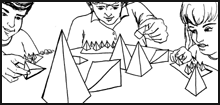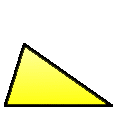 |
|
|
ICEHOUSE MYSTIQUE
 |
|
|
MYSTIQUE?
As you hopefully have realized from playing Icehouse and reading Andrew Looney's novel, The Empty City, there is more to Icehouse than learning the rules and trying to win. There is the mystique: the way to play, the set of attitudes and ideas involved. The mystique of a board game is not a new idea. It is what gives a game personality and keeps people interested; it's what keeps a game from fading into obscurity. Go, a 5,000 year old board game from China, has mystique. That's why it's still played today. Chess has mystique. Even Checkers does, although it's quite different from Go or Chess. Go is to ancient Chinese territorial disputes as Chess is to medieval positional warfare as Checkers is to... Snuffy Smith. This section lays the groundwork for the ever-growing mystique behind the game of Icehouse.
ETIQUETTE: THE NOTION OF "COOL"
A good Icehouse player not only uses clever strategies and diplomacy, but is also skilled at the art of being "cool." "Cool" is a playing style only achieved by those who realize that the rules of etiquette in Icehouse are just as important as the technical rules of play. Playing in a cool way mostly means to keep the game going; limit arguments and strategies that make the game less enjoyable. This does not mean that a cool player is wimpy, or mellow to the point of being boring. It means that no matter what kind of player he is (from nice diplomat to evil executioner) he plays with a style that will make others enjoy playing with him, even if he wins a lot.
Below is a list of cool and uncool methods of play. This is by no means a complete list, but it should give you an idea of accepted Icehouse conduct. Also, remember that just because one tactic is cool does not necessarily mean that its opposite is uncool.
COOL
Cool Diplomacy - Trying to achieve difficult diplomatic maneuvers (like breaking an ice fortress with another player, making allies, etc.) with a minimum of talk. Hand signals, facial expressions, and cryptic messages such as "Enact Plan A!", followed by movement of pyramids make the game more enjoyable by creating an air of tension and secrecy.
Cool Crash - Giving your piece to another player after you have crashed, before (or without) being told. It is the cool Icehouse player who casually admits failure, hands it over, and continues the game. The other players will remember your coolness.
The Sneak Attack - Waiting until a player leaves the
table (to get a drink, or go to the bathroom, for instance) allowing
you to create or break ice fortresses, ice his pieces, and/or
put him in the icehouse. No, this is not in the wrong column.
The sneak attack is cool. Ice-cool. So is saying "Hey! Look
over there!" and placing pieces.
The Long Meltdown - Pointing out a player's meltdown well after
you have recognized its existence, but before he has placed standing
pieces. This means that the player who has created the meltdown
must remove all of his attack pieces, giving you lots of time,
space, and opportunity to really mess up the rest of his game.
This is not a cool move if done to a beginning player who barely
knows what a meltdown is.
Conversation - Unlike chess, Icehouse is not necessarily a quiet game, even during the most formal matches. Discussing trivial, non-Icehouse related topics during a game (such as whether your Braunschweiger sandwich tastes like cat food) is more pleasant than discussing the game itself, and has an added bonus of distracting opponents. Of course, keeping quiet is sometimes a better strategy, and is just as cool.
Instruction - When new players question a strategy or action during a game, stop whatever you are doing and educate the players. It is also cool to inform someone he's about to be put in the icehouse (provided he is a beginning player).
UNCOOL
Uncool Diplomacy - Having tedious arguments and long
conversations over something like whether or not a piece should
be over-iced in order to break an ice fortress. This not only
can slow the game down, it can also display tactics or options
that you might rather keep secret.
Uncool Crash - It is very tempting (and of course, uncool) to
continue playing after crashing, hoping that no one has seen your
mistake. It is also uncool to announce loudly that an opponent
has crashed, especially when it is a small crash that doesn't
disturb anything (some call this a "near-crash" or a
"jiggle").
Quitting - Quitting a game is fine, so long as you transfer all your pieces that are on your stash to the playing field (technically this is not "quitting," it's "playing quickly"). Quitting during a five game match unless you have a very good reason is considered uncool.
Uncool Conversation - Arguing for a long time over whether a piece is iced (or squandered). If you must argue, save it for the end of the game when players are counting their scores.
Intentional "Bad Play" - This includes: crashing on purpose, calling icehouse without believing someone is in the icehouse, creating an intentional meltdown, and deliberately placing your own attack piece so that it is squandered. At times it may be very strategic to "accidentally" make a bad play. It is not against the rules to do this, and it can be faked well enough that no one will notice the "mistake" was done on purpose. However, it is contrary to the spirit of Icehouse, and extremely uncool. Anyone who plays this way should be maimed - I mean should play some other game, instead.
Obstructing Placement - Blocking an area by covering it with your hand, thereby keeping other players from placing or removing pyramids. It is okay to take back a piece that you are placing, as long as you are still touching it. However, holding a piece over a certain area just to keep others from playing there is uncool. And anyone who is reading this should not have to be told that pushing another player's hand out of the way is moronic.
 |
 |
 |